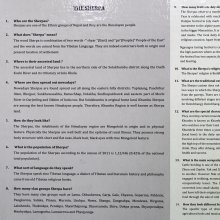Garja, Garjā: 11 definitions
Introduction:
Garja means something in Buddhism, Pali, Hinduism, Sanskrit. If you want to know the exact meaning, history, etymology or English translation of this term then check out the descriptions on this page. Add your comment or reference to a book if you want to contribute to this summary article.
Images (photo gallery)
In Hinduism
Purana and Itihasa (epic history)
Source: archive.org: Shiva Purana - English TranslationGarja (गर्ज) or Sugarja refers to “roaring clouds”, according to the Śivapurāṇa 2.2.20. Accordingly as Brahmā narrated to Nārada:—“[...] O excellent sage, those clouds rumbling and roaring with hideous sounds dropping showers at the slightest wish of Śiva burst asunder in the sky. When the sky was covered by those roaring clouds (Garja/Sugarja), Śiva and the Goddess Śivā were quite calm”.

The Purana (पुराण, purāṇas) refers to Sanskrit literature preserving ancient India’s vast cultural history, including historical legends, religious ceremonies, various arts and sciences. The eighteen mahapuranas total over 400,000 shlokas (metrical couplets) and date to at least several centuries BCE.
Ayurveda (science of life)
Veterinary Medicine (The study and treatment of Animals)
Source: Shodhganga: Portrayal of Animal Kingdom (Tiryaks) in Epics An Analytical studyGarja (गर्ज) (lit. “a roaring elephant”) is a synonym (another name) for the Elephant (Gaja), according to scientific texts such as the Mṛgapakṣiśāstra (Mriga-pakshi-shastra) or “the ancient Indian science of animals and birds” by Hamsadeva, containing the varieties and descriptions of the animals and birds seen in the Sanskrit Epics such as the Ramayana and Mahabharata.

Āyurveda (आयुर्वेद, ayurveda) is a branch of Indian science dealing with medicine, herbalism, taxology, anatomy, surgery, alchemy and related topics. Traditional practice of Āyurveda in ancient India dates back to at least the first millenium BC. Literature is commonly written in Sanskrit using various poetic metres.
In Buddhism
Tibetan Buddhism (Vajrayana or tantric Buddhism)
Source: OSU Press: Cakrasamvara SamadhiGarja (गर्ज) refers to a “roar”, according to the Guru Mandala Worship (maṇḍalārcana) ritual often performed in combination with the Cakrasaṃvara Samādhi, which refers to the primary pūjā and sādhanā practice of Newah Mahāyāna-Vajrayāna Buddhists in Nepal.—Accordingly, “Oṃ amṛta-kuṇḍalī kha kha khāhi khāhi tiṣṭha tiṣṭha bandha bandha Hana hana daha daha paca paca garja garja visphoṭaya visphoṭaya Sarva-vighna-vināyakānāṃ mahā-gaṇapati-jīvitāntakarāya Hūṃ hūṃ phaṭ phaṭ svāhā!”.

Tibetan Buddhism includes schools such as Nyingma, Kadampa, Kagyu and Gelug. Their primary canon of literature is divided in two broad categories: The Kangyur, which consists of Buddha’s words, and the Tengyur, which includes commentaries from various sources. Esotericism and tantra techniques (vajrayāna) are collected indepently.
Languages of India and abroad
Sanskrit dictionary
Source: DDSA: The practical Sanskrit-English dictionaryGarja (गर्ज).—[garj-bhāve ghañ]
1) The roaring of elephants.
2) The rumbling or thundering of clouds.
3) A (roaring) elephant.
4) Roaring, thundering.
Derivable forms: garjaḥ (गर्जः).
--- OR ---
Garjā (गर्जा).—The thundering of clouds.
See also (synonyms): garji.
Source: Cologne Digital Sanskrit Dictionaries: Shabda-Sagara Sanskrit-English DictionaryGarja (गर्ज).—n.
(-rjaṃ) 1. The roaring of elephants. 2. The grumbling of clouds, &c. E. garj to roar or growl, affix ac.
Source: Cologne Digital Sanskrit Dictionaries: Cappeller Sanskrit-English DictionaryGarja (गर्ज).—[masculine] na [neuter] roar, noise, thunder.
Source: Cologne Digital Sanskrit Dictionaries: Monier-Williams Sanskrit-English Dictionary1) Garja (गर्ज):—[from garj] m. ([Pāṇini 7-3, 59; Kāśikā-vṛtti]) a (roaring) elephant, [cf. Lexicographers, esp. such as amarasiṃha, halāyudha, hemacandra, etc.]
2) [v.s. ...] the roaring (of elephants), rumbling (of clouds), etc., [Śārṅgadhara-paddhati] ([varia lectio])
3) Garjā (गर्जा):—[from garja > garj] a f. idem, [cf. Lexicographers, esp. such as amarasiṃha, halāyudha, hemacandra, etc.]
4) [from garj] b f. of ja q.v.
Source: Cologne Digital Sanskrit Dictionaries: Yates Sanskrit-English Dictionary1) Garja (गर्ज):—(ki) garjati garjayati 1. 10. a. To sound, to rumble, to roar.
2) (rjaṃ) 1. n. The roaring of elephants; grumbling of clouds.
Source: DDSA: Paia-sadda-mahannavo; a comprehensive Prakrit Hindi dictionary (S)Garja (गर्ज) in the Sanskrit language is related to the Prakrit word: Bukka.
[Sanskrit to German]
Sanskrit, also spelled संस्कृतम् (saṃskṛtam), is an ancient language of India commonly seen as the grandmother of the Indo-European language family (even English!). Closely allied with Prakrit and Pali, Sanskrit is more exhaustive in both grammar and terms and has the most extensive collection of literature in the world, greatly surpassing its sister-languages Greek and Latin.
See also (Relevant definitions)
Starts with (+2): Garjabha, Garjai, Garjak, Garjaka, Garjala, Garjamana, Garjan, Garjana, Garjana-tarjana, Garjanaka-adhiraja, Garjanakala, Garjanashabda, Garjane, Garjani, Garjanika-adhiraja, Garjaniya, Garjanti, Garjaphala, Garjara, Garjaraka.
Ends with: Abhigarja, Vigarja.
Full-text: Bukka, Garjaphala, Garji, Vigarja, Grij, Jivitantakara, Vinayaka, Visphota, Mahaganapati, Garj, Garjana, Garjita, Vrish, Gaja.
Relevant text
Search found 4 books and stories containing Garja, Garjā; (plurals include: Garjas, Garjās). You can also click to the full overview containing English textual excerpts. Below are direct links for the most relevant articles:
Amarakoshodghatana of Kshirasvamin (study) (by A. Yamuna Devi)
Atmosphere, space, direction, etc. < [Chapter 5 - Aspects of Nature]
Chaitanya Bhagavata (by Bhumipati Dāsa)
Verse 2.8.39 < [Chapter 8 - The Manifestation of Opulences]
Verse 1.6.100 < [Chapter 6 - The Lord Begins Studying and His Childhood Mischief]
Trishashti Shalaka Purusha Caritra (by Helen M. Johnson)
Appendix 5.2: new and rare words < [Appendices]
Elephantology and its Ancient Sanskrit Sources (by Geetha N.)
